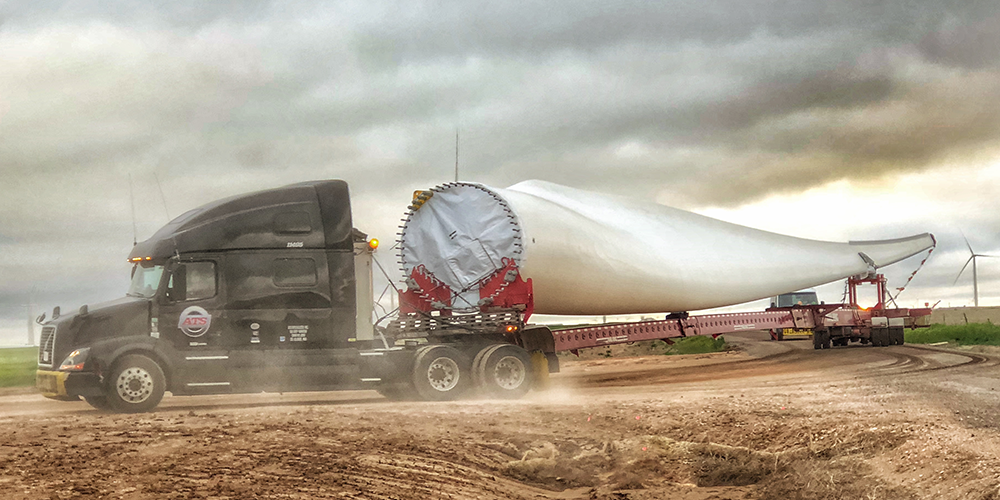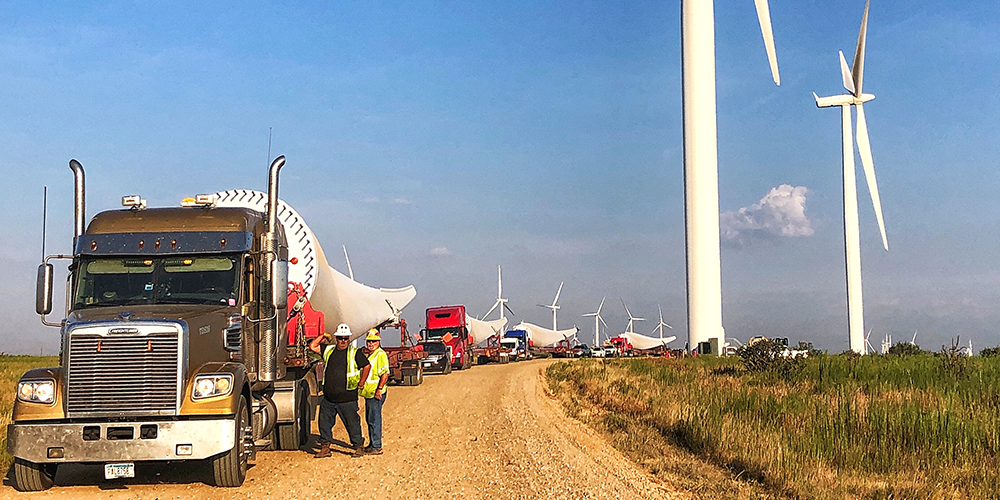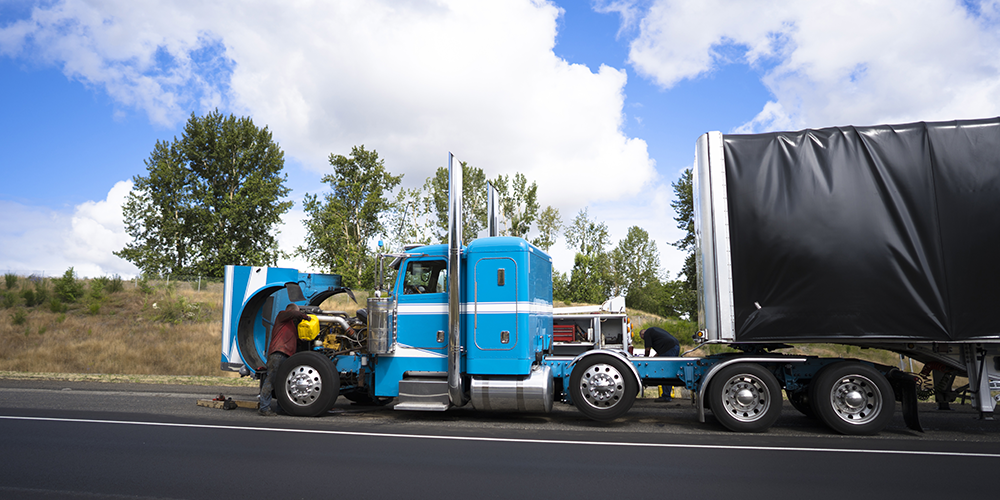
When it comes to executing your projects, it’s vital that everything goes as smoothly as possible. And if you’re the person responsible for developing the project, that probably means you have a say in all major aspects of the planning process.
After all, you don’t want to have trucks arriving on-site only to learn that they are routed from a different direction than you had planned — or that the site roads weren’t built correctly for your carrier's trailers. That’s a risk you take when you don’t work directly with your carrier.
We’ve been helping plan and execute projects for decades as a leader in wind energy transportation. So we understand how complicated projects can be — and the frustrations that come with miscommunication between multiple parties.
One of the main things we’ve learned is there are several benefits to working directly with a carrier when planning the transportation of components headed to your project site. To ensure things go smoothly, here are the top six benefits of working directly with a carrier.
1. Create a More Efficient Project Site
Efficiency is key to the success of your project — and its budget. People and equipment standing by can mean added costs. And in many cases, the reason for this is due to poor planning or an inefficient site.
You could have everything planned out perfectly; the cranes in position, the crews ready and the trucks hauling the components arriving just in time. Then you discover a problem.
The trucks dropping off the components can’t access the site until the trucks leaving the site are gone. This creates congestion on site roads and could take anywhere from a few minutes to a few hours to clear up each time. Not only does this pose a safety concern, but it also could become a costly and ongoing issue.
If you work directly with a carrier, they’ll identify any potential pain points to be resolved prior to the project beginning in order to have everyone working at maximum efficiency. You should also include them early in the planning process so you can adjust your other plans if needed.

2. Reduce the Risk of Markup
Price markup is something we all deal with virtually every day. A manufacturer sells a product to a retailer and that retailer sells a product at a higher price so they can earn a profit. If given the opportunity, working directly with the manufacturer will more times than not cost you less to purchase that product.
The transportation industry can see the same thing.
If you work with a third party and have them book the trucks, cranes, people, whatever it happens to be, you’ll likely see it come at a premium. After all, they not only need to pay administrative and oversight costs but they also want to take home a bit of margin.
If you work directly with a carrier to handle your project freight — just like working directly with a manufacturer for that product you’re looking to purchase — you won’t have to pay extra to cover the administrative costs of the middle party.
Related: 7 Keys for Receiving Competitive and Effective Project Freight Quotes
3. Work With a Carrier You Can Trust
As you’ve been planning projects for the past several years — or more — you’ve discovered which carriers you prefer to work with and those you’d rather not work with.
If you’re the one booking the transportation providers, you can choose exactly which carriers you want to open the bidding process to and which ones you want to exclude.
If you have another party coordinate the transportation providers, you’re stuck working with whichever carrier they choose.

4. Clearer Communication
Playing the game of telephone was fun in elementary school, but it’s not as fun when your livelihood depends on it. One small miscommunication could lead to major delays and financial implications.
When you cut out the middle party between you and the transportation provider, you get the answer you need straight from the source. Beyond miscommunication concerns, you’re saving time when you communicate directly since you don’t have to wait for your contact to get in touch with the person who holds the answer.
Instead, you can reach out to your single point of contact whenever it’s convenient for you. And if you work with a carrier that offers boots-on-the-ground support, your point of contact will have firsthand knowledge of the project from the site itself.
5. More Expertise With One Provider
When it comes to projects, there are a lot of moving pieces involved in making them successful. From route planning to site infrastructure, and boots-on-the-ground to dedicated project management support, many experts make up a project.
But depending on which transportation provider you choose, you can get all of that expertise with one call. And I don’t mean that your transportation provider can just coordinate all of those services, I mean they actually have in-house experts in each of those categories.
The carriers that can provide that expertise ensure proper routing and obtain the proper permits.
They’ll conduct in-depth route surveys to mitigate the risk of incidents while finding the most efficient routes possible. That also allows them to discover exactly which permits are necessary to transport your components along the specific routes.
Since they have dedicated resources in-house, they’ve already created well-established relationships with state and local transportation departments. This means they may be able to leverage those relationships to obtain a specific route or help to keep a route free of restrictions throughout the duration of your project.
Finally, their experience lends the ability to provide accurate estimated times of arrival, so you can reduce downtime for cranes and other equipment since you have a better idea as to when you can expect the components to arrive onsite.

6. Faster Resolutions When Issues Arise
In the transportation industry, it’s not necessarily a matter of if something could go wrong, it’s more a matter of when. With so many factors out of our control — like weather, road construction or accidents — it’s likely you’re impacted by something at some point.
So if or when that happens, you’ll be able to resolve issues quicker if you work directly with a carrier as opposed to working through another party.
You can reach your point of contact with the carrier — whether it’s a customer service representative, your project manager or onsite supervisor — and figure out a plan of attack to resolve the issue.
Consider the time it would take for you to explain what’s going on to your contact with the third party, then have them relay your message to the carrier, just to have the carrier explain the situation back to the third party before they relay the message to you. Even that sentence was complicated trying to describe it…
Why Should You Work Directly With a Carrier?
If you’re looking for smooth execution of your next project (which I’m sure you are), you should consider working directly with the transportation provider as opposed to having someone else manage transportation.
If you take responsibility, you’ll have a better experience in the following areas:
- Creating a more efficient site
- Reduced risk of markup
- Work with a carrier you trust
- Clear communication
- Additional services with one provider
- Faster resolution when claims arise
Giving up control in some aspect of your job can be convenient — and necessary for your sanity in some cases — but take it from us, transportation is probably not that area.
By working directly with the carrier responsible for safely delivering your components to the site, you’ll increase the odds of successful project execution.



